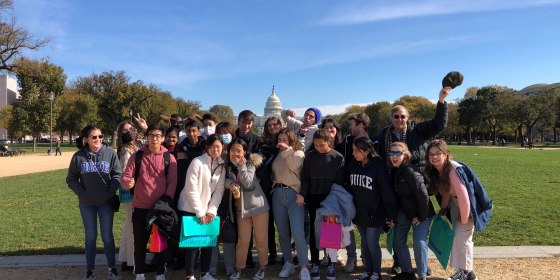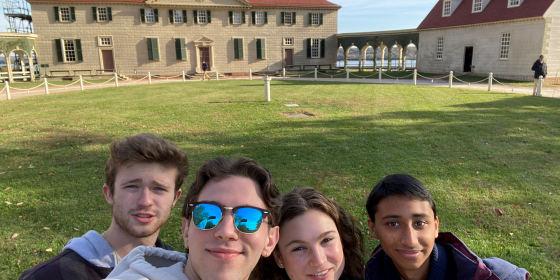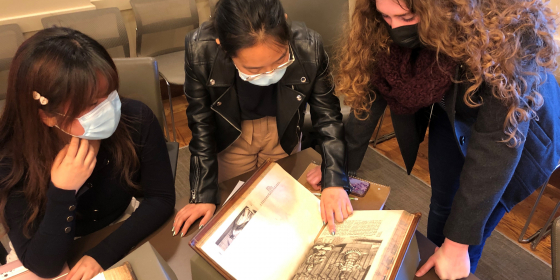Dr. Thomas Robisheaux is Professor of History at Duke University. In this interview, he discusses what he describes as the “most exciting and rewarding” teaching experience he has had in his career at Duke: teaching and leading the Medieval and Renaissance Studies Focus Program. The Focus Program is a unique opportunity for first-year Duke undergraduates to build community through cross-disciplinary exploration of a range of topics, from poetry and mathematics to art and technology.

Focus is a residential learning program for first-semester students. It must have been a challenge leading the Medieval and Renaissance Studies program offering in fall of 2020. What was the program’s focus and how did that work during the pandemic?
Our program theme was “Science, Mathematics, and Harmony in the Renaissance,” which included three courses: “Thinkers, Discoverers, and Problem Solvers” taught by Astrid Giugni (English and Information Science + Studies), “Music, Medicine, and Natural Science” taught by Roseen Giles (Music), and my course called “Engineers, Doctors, and Scientists in the Renaissance.” It worked extremely well despite the campus being closed down during the pandemic. I was surprised, students were surprised, and other faculty were surprised. I know it worked because of a poll that was taken of freshmen about their experience. I saw the results about how well our Medieval and Renaissance Focus Program worked for them.
Let me explain why it worked well. First of all, students resided in close proximity to one another on west campus. So, they did get to know each other. But what was really wonderful was how they came together to create a community. In the poll, they mentioned that one of their crucial experiences of their whole freshman year was the community they formed as part of the Med-Ren Focus group. Everyone was worried about this. We weren’t having classes in person. We didn’t have our weekly evening program meeting in person. But as it turned out, students did form a meaningful community, and I give them a lot of credit for that. They showed incredible ingenuity in getting to know one another outside of the classes. But also, in our weekly program meetings, we had a lineup of guests who showed students how the Renaissance period lives on in our culture. They were just amazing, with a high level of engagement in those weekly meetings. So, I began the semester with a lot of worries and fears. But I finished quite amazed at how well it worked.
How did you as an instructor find that students responded to the challenges of the pandemic?
I thought they were very conscientious. It was impressive how they kept the guidelines, even though I know it made for a diminished first-year experience. They also looked out for each other with as much grace as possible in such a difficult situation. I felt the Focus program facilitated this extraordinary communal mindset. Some Focus students establish friendships that last years. They become very, very close with each other. They inspire each other, too. I saw that in my own Focus class. Some of my students were amazed at the interest and perspectives that their classmates would bring to the material.
What plans did you have for the program in the fall 2021 term?
Our program theme “Science and the Humanities in Medieval and Renaissance Europe” included courses taught by Martin Eisner in Romance Studies (“Dante’s Moon”), Astrid Giugni in English and Information Science + Studies (“The Poetry of Math and the Mathematics of Language in the Renaissance”), and my own course, “Engineers, Doctors, and Scientists in the Renaissance.” We had classes in person once again. Everyone looked forward to that. We held our once-per-week evening meetings featuring interdisciplinary presentations by guest speakers, who continued with the theme about how Renaissance culture did not end with the Renaissance. It’s all around us—if you have eyes and ears to see and hear it. For example, a cognitive psychologist and an art historian worked with students to look at a Renaissance painting as an opportunity for self-reflection. The students were very engaged by that. I often have an art conservationist lead a meeting. I’ve found that students are astonished to learn that contemporary science and technological developments are vital to understanding Renaissance art.
After missing the opportunity in 2020, because of the pandemic, to take the usual program trip to Washington, DC, the 2021 group relished the chance to travel and be away from campus a bit. The group toured the National Gallery of Art and the Smithsonian National Museum of Asian Art on the Mall, and also took an excursion to George Washington’s estate at Mount Vernon.


What are some of the primary advantages of the Focus program for students?
Today, many students come to the Focus program with an interest in the sciences. I’ve found they are grateful for the chance to recognize how the sciences are embedded in the wider humanities. For example, Professor Giugni does fantastic stuff with mathematics, coding, encryption, and Renaissance culture in her course. Students also love the opportunity to broaden themselves culturally. Most of all, though, they love getting to know interesting students and faculty and beginning to learn how to do research on a level that was not possible for them before.


How have you seen students grow because of the program?
It’s wonderful to see. Gabby McDonald (class of 2021) is an excellent example of that. She had a chance to do honors for her Biology major, but she found it a lot more interesting and challenging to develop a project in her Medieval and Renaissance Studies major. That balance that she found is typical of a number of students in the Focus program. In another example, there was a Mechanical Engineering student [Elijah Weinreb, class of 2018] who minored in Medieval and Renaissance Studies. This student created a senior honor’s project designing a drone based on Leonardo da Vinci’s models for a flying machine. His Engineering professors had never seen a project like this, and he was so enthused about the opportunity to work across disciplines.
Something that surprises students in my classes is just how much Renaissance science is embedded in religious cultures. That sparks some interesting conversations. They are also enchanted to discover how so many seemingly contemporary scientific accomplishments reach deeply and far back into the Renaissance. They are surprised to see how their own education and interests are grounded in Renaissance culture.
What do you get out of the Focus program as an instructor?
I have told colleagues that this is the most exciting and rewarding teaching experience that I have ever had at Duke. I’ve been on the faculty forty years, so my memory goes back a long time—my involvements with the Focus program over the last five years are the best teaching experiences I’ve had. Why is that? Because you work with highly motivated and engaged students, and you get to know them as individuals. In this day and age, it’s so important for students to realize the value of the humanities in their education. The humanities are suffering badly. But in the Focus program students come to see that we truly need the humanities. They just have not had chances to integrate the humanities into their education in a meaningful way. Once they do have that chance, their perspectives on their Computer Science or Biology degrees change dramatically, and that is so satisfying to see as an instructor.
Read about the fall 2022 Medieval and Renaissance Focus program